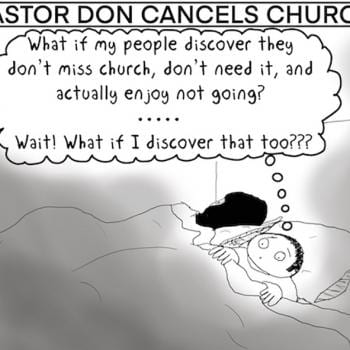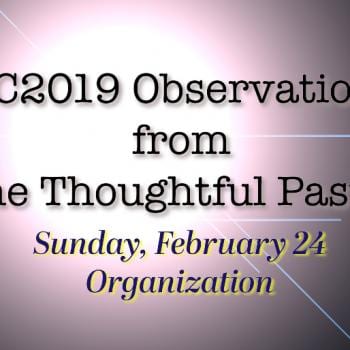In The United Methodist Church, most clergy moves generally take place in the summer, after our Annual Conferences. This traditional time, along with school year schedules and extended summer vacations, are relics of our agricultural roots. Summer months had to be set aside for the survival needs of crop care, sowing, harvesting, and preserving.
It’s one of those traditions that is rarely questioned, but may have served its time. We hardly live in a rural, agriculturally dictated world any longer.
When I made the complicated decision to retire, I knew that I needed to do so as soon as possible for the sake of my congregation. Yes, I could have “hung-on” for another six months for the sake of Conference convenience, but to me the idea of “hanging-on” is beyond distasteful. It would have been damaging to the church I loved, and to me as a person. More, it would have been a disobedient move to what I very much saw and experienced as the Spirit of God leading and guiding me into this decision. So, December 31st, 2013 it would be–and the Bishop gracefully understood and honored that decision.
I worked hard to prepare the church for that mid-year move, and as I did so, began to be aware that there are significant advantages to the incoming clergy for a January 1 arrival date. I offer them here as my insights, and invite dialogue with others on these factors.
One: Leadership Issues
The leadership team for the year has already been determined. A big problem with the July move: the incoming pastor must begin the Lay Leadership/Nominations process within weeks of arrival, and will not know anyone well yet. An already established group of lay leadership (ideally well considered by the outgoing pastor) makes for a smoother entry.
Two: Get Acquainted Time Improved
January-Easter tend to be high attendance months, giving everyone a better chance to get to know each other before the summer travel months set in. Ideally, she/he offers the best material possible during those months, while doing that necessary get-acquainted work with the church and community. Then, during the quieter summer months, there is time for more knowledgable planning for the extremely critical back-to-school attendance bubble. The early July move, with the inevitable settling-in time and often extended absences of key leadership, often means inadequate yet vital back-to-school preparation
Three: The Apportionment Situation
I have known many clergy friends who upon their July move, were told by their predecessors or finance ministry of the new church, “Oh, by the way, we have not yet paid any of our apportionments for this year.” Should a pastor move into a church where apportionments were not fully paid (not the case with the church I served, thank goodness), he/she can at least start with a clean slate, and not be in frantic catch-up mode immediately.
Four: Important Statistical Information
Check-out day becomes an immediate task. While this may not seem like an advantage, it also means the new pastor immediately gains a good overview of the state of the church, its membership, its finances, scope of ministry and outreach. This important piece of knowledge can help define the types of prophetic messages appropriate for that local gathered body. It also means the next check-out day reflects their own ministry, not half-predecessor/half-current. First year stats then are considerably more valid that way.
Five: Children and School
If the new clergy has children, they immediately start school. Yes, mid-year moves can be hard on them, but it also means they can make friends and find out who lives near them before summer starts. And it is a great way for the new clergy person to start to know the community immediately.
Major Downside: Moving/Good-bye Process
It does mean getting packed and ready to move right at the time of the extra Christmas services plus the family expectations of that time of the year. However, there is generally a couple of quiet weeks after that for getting settled. I do know that as the outgoing pastor, this was extremely tough, as I was also saying goodbye to a very much loved congregation and they to me. But good-byes are often tough, no matter what time of year we are doing them.
















